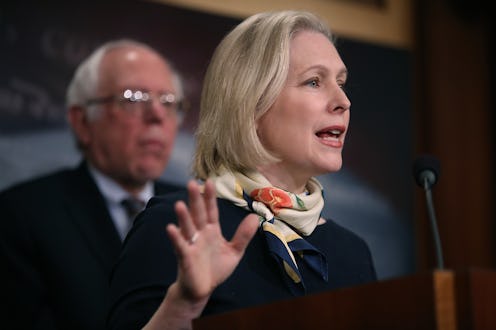News
Senators Are Speaking Out On The Senate Rule Change

Senators are speaking out against the forced Senate rule change that will allow Neil Gorsuch to be confirmed to the Supreme Court by a simple majority vote rather than the traditional 60 vote requirement. And among them is Kristen Gillibrand, the junior U.S. senator from New York. Earlier in the day, she tweeted a similar sentiment reading, "Changing the rules for President Trump to get his Supreme Court nominee through is an historic mistake. #StopGorsuch." If Gorsuch is confirmed, he will fill the spot left vacant by the late Antonin Scalia.
Gillibrand, an outspoken advocate for increasing the number of women elected officials, wasn't alone in opposing the rule change in recent days, and she certainly isn't alone in opposing it now that the change has come to pass. Senators are quickly taking to the internet to make their positions clear.
Among Democrats' reasons for opposing Gorsuch are the GOP's treatment of Obama's Supreme Court nominee Merrick Garland and what Sen. Chuck Schumer called the judge's “right wing, pro-corporate, special interest agenda.” During his nomination speech, Trump painted a different portrait of Gorsuch, saying, "Judge Gorsuch has a superb intellect, an unparalleled legal education, and a commitment to interpreting the Constitution according to its text. He will make an incredible Justice as soon as the Senate confirms him."
Several other Senators released statements. Some focused on Gorsuch, like Sen. Kamala Harris' strong words in a tweet following the Senate rule change.
Others focused on the Senate GOP and Republican leadership.
Still, a number of Republican Senators took to social media to voice their steadfast support for Gorsuch, as well.
The effects of this historic rule change may not be fully understood for years. But Sen. John McCain to a moment to talk about it on the Senate floor on April 5:
Now that we are entering into an era where a simple majority decides all judicial nominations, we will see more and more nominees from the extremes of both the left and the right. ... I do not see how that will ensure a fair and impartial judiciary. In fact, I think the opposite will be true and Americans will no longer be confident of equal protection under the law.
This isn't the first time Senate has changed the rules on confirming presidential nominees to court, but it is the biggest rule change when it comes to nominations to the Supreme Court specifically. The final vote for Gorsuch's confirmation is set to take place on April 7.